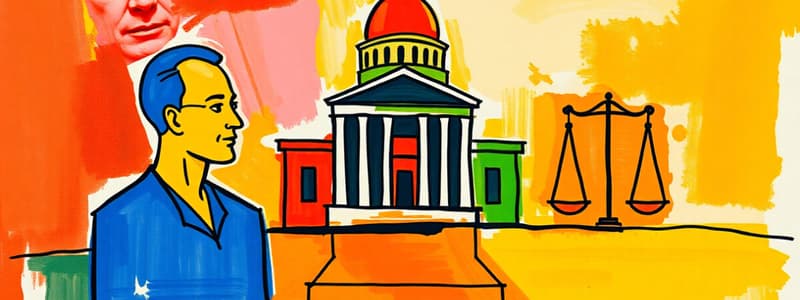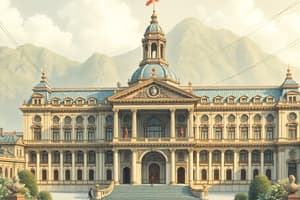Podcast
Questions and Answers
Hadji Yunnos is the Division EPS In-Charge of LRMS.
Hadji Yunnos is the Division EPS In-Charge of LRMS.
True (A)
The instructional material was developed only by private educators.
The instructional material was developed only by private educators.
False (B)
Teachers are encouraged to send feedback to [email protected].
Teachers are encouraged to send feedback to [email protected].
True (A)
The module on State and Non-state Institutions is designed for K to 12 Curriculum standards.
The module on State and Non-state Institutions is designed for K to 12 Curriculum standards.
Learners are expected to complete the module at a fixed pace set by the facilitator.
Learners are expected to complete the module at a fixed pace set by the facilitator.
The module includes a section labeled 'Notes to the Teacher' with helpful tips.
The module includes a section labeled 'Notes to the Teacher' with helpful tips.
The telefacsimile number listed is 02-929-0153.
The telefacsimile number listed is 02-929-0153.
The alternative delivery mode (ADM) is aimed at making education less accessible.
The alternative delivery mode (ADM) is aimed at making education less accessible.
Alex and Toni are considered seasoned news anchors.
Alex and Toni are considered seasoned news anchors.
The President and Vice President of the Philippines are chosen by direct popular vote.
The President and Vice President of the Philippines are chosen by direct popular vote.
The Legislative branch of the Philippine government includes the Senate and the House of Lords.
The Legislative branch of the Philippine government includes the Senate and the House of Lords.
The Judiciary branch is responsible for making laws in the Philippine government.
The Judiciary branch is responsible for making laws in the Philippine government.
The political structure of a society is a way power is allocated and decisions are made.
The political structure of a society is a way power is allocated and decisions are made.
The organizational chart of the Philippine Government is not available online.
The organizational chart of the Philippine Government is not available online.
Cabinet members in the Philippine government are appointed by the Congress.
Cabinet members in the Philippine government are appointed by the Congress.
A Supreme Court is part of the Judicial branch in the Philippines.
A Supreme Court is part of the Judicial branch in the Philippines.
The Constitution grants the Supreme Court the authority to declare laws and treaties unconstitutional.
The Constitution grants the Supreme Court the authority to declare laws and treaties unconstitutional.
Power is defined as the ability to face any opposition in achieving desired outcomes.
Power is defined as the ability to face any opposition in achieving desired outcomes.
According to Weber, governments can rely solely on brute force to maintain their power.
According to Weber, governments can rely solely on brute force to maintain their power.
Traditional Authority legitimizes power through modern legal systems.
Traditional Authority legitimizes power through modern legal systems.
Charismatic Authority is dependent on the extraordinary personal traits of a leader.
Charismatic Authority is dependent on the extraordinary personal traits of a leader.
Economic activity plays a negligible role in societal complexity and cultural development.
Economic activity plays a negligible role in societal complexity and cultural development.
Changes in means of production can significantly impact the functioning of society.
Changes in means of production can significantly impact the functioning of society.
An increase in petrol prices can indirectly affect the prices of other goods, such as fruits and vegetables.
An increase in petrol prices can indirectly affect the prices of other goods, such as fruits and vegetables.
Negative reciprocity involves individuals gaining the maximum profit while providing minimal return.
Negative reciprocity involves individuals gaining the maximum profit while providing minimal return.
Taxes are collected from individuals based on their spending habits.
Taxes are collected from individuals based on their spending habits.
Charitable donations function in the same manner as taxes, redistributing resources to the community.
Charitable donations function in the same manner as taxes, redistributing resources to the community.
The process of redistribution is usually overseen by community members with no authority.
The process of redistribution is usually overseen by community members with no authority.
Individuals involved in deceptive advertising are commonly seeking publicity.
Individuals involved in deceptive advertising are commonly seeking publicity.
The central authority in redistribution processes is always a single individual.
The central authority in redistribution processes is always a single individual.
In redistribution, goods produced from the community are stored, counted, and later distributed back to the same community.
In redistribution, goods produced from the community are stored, counted, and later distributed back to the same community.
Individuals entering business ventures without personal relationships are likely to gain more than they contribute.
Individuals entering business ventures without personal relationships are likely to gain more than they contribute.
A bank primarily receives deposits from individuals and generates credit for them.
A bank primarily receives deposits from individuals and generates credit for them.
Investment banks provide services primarily for ordinary individuals and small businesses.
Investment banks provide services primarily for ordinary individuals and small businesses.
Commercial banks focus on managing large investments rather than individual savings.
Commercial banks focus on managing large investments rather than individual savings.
The social implications of non-state institutions during a community quarantine can significantly impact individuals.
The social implications of non-state institutions during a community quarantine can significantly impact individuals.
Banks are considered non-state institutions.
Banks are considered non-state institutions.
The role of banks does not change during an enhanced community quarantine.
The role of banks does not change during an enhanced community quarantine.
Behavior of financial institutions can influence community welfare during economic disruptions.
Behavior of financial institutions can influence community welfare during economic disruptions.
Investment banks are often involved in purchasing newly issued shares and selling them at a profit.
Investment banks are often involved in purchasing newly issued shares and selling them at a profit.
Flashcards are hidden until you start studying
Study Notes
State Institutions
- Political structure or institution is the organized way in which power is allocated and decisions are made within society
- Executive branch includes the President and Vice President, chosen through direct popular vote, with a six-year term.
- The President appoints a Cabinet to oversee departments within the bureaucracy.
- The Legislative branch is comprised of the Senate and House of Representatives, with the power to create, alter, and reverse laws.
- The Judicial branch resolves disputes and includes a Supreme Court and lower courts.
- The Supreme Court has the power of Judicial Review, allowing it to declare laws and decrees unconstitutional.
- Power is the ability to achieve desired outcomes despite opposition, and the government utilizes it to demand compliance from the people.
- To ensure compliance, governments strive to establish legitimacy in the eyes of the people.
- Authority is power that people perceive as legitimate rather than coercive.
- There are three types of authority:
- Traditional Authority: Legitimizes power by respecting long-standing cultural patterns.
- Rational-Legal Authority (Bureaucratic Authority): Leitimizes power through legally created rules and regulations.
- Charismatic Authority: Legitimizes power based on exceptional personal skills inspiring devotion and obedience.
Economic Institutions
- Economic activity is essential for human life, influencing social and cultural life.
- Changes in production and distribution can significantly impact society.
- Economic institutions provide essential goods and services through collective effort.
- The concept of reciprocity, based on give-and-take exchanges, exists in various forms, such as:
- Positive Reciprocity: Involves the exchange of goods and services with the expectation of immediate return.
- Balanced Reciprocity: Focuses on maintaining a balance in exchanges over time.
- Generalized Reciprocity: Involves giving without expecting immediate or specific repayment.
- Negative Reciprocity: Attempts to gain as much as possible while providing the least possible in return.
- Redistribution involves collecting goods and services from members of a community and redistributing them to different members.
- The central authority oversees the collection and distribution process.
- Examples include:
- Taxes: Collected from individuals based on income and redistributed through government programs.
- Charitable Donations: Function similarly, with contributions being distributed to those in need.
Studying That Suits You
Use AI to generate personalized quizzes and flashcards to suit your learning preferences.




